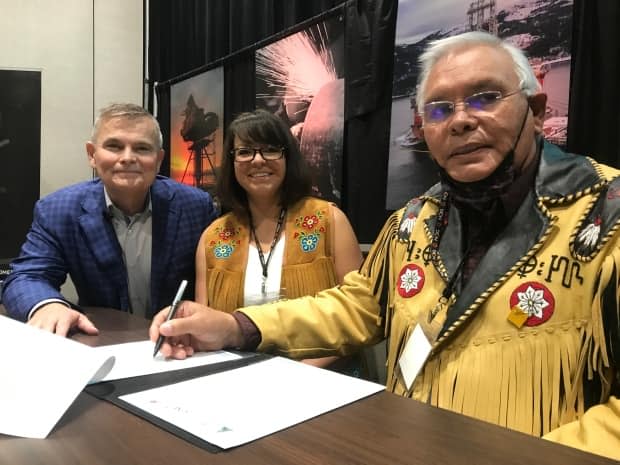First Nations groups to participate in project to capitalize on liquefied natural gas


The Miawpukek First Nation and the First Nations Major Projects Coalition have signed an agreement to work toward increased equity participation in a project to earn revenue from liquefied natural gas.
The agreement, which was signed on the first day of the Newfoundland and Labrador Oil and Gas Industries Association conference in St. John's, represents the first-ever Indigenous participation in an offshore energy project in the province.
"The benefits by way of own source revenue generation and the jobs this project will create for our community members is significant and a big part of our plan for self-sufficiency," said Miawpukek First Nation Chief Misel Joe in a statement.
The project, called LNG Newfoundland and Labrador, involves building a central gas hub near the four oil producing fields in the Jeanne d'Arc Basin and a 600 km subsea pipeline to Grassy Point in Placentia Bay. The project would also require construction of a special ship to produce liquefied natural gas and then transport it to Europe.
In a presentation, LNG Newfoundland and Labrador CEO Leo Power said the project would capitalize on demand from countries like Germany, which he said is looking to diversify its natural gas supply.

According to Power's presentation, the plan is to sanction the project in three or four years, and begin producing about four million tonnes of liquefied natural gas annually by 2030.
The project is expected to cost $10 billion, and Power said he expects investment to come in from around the world.
Joe said the Miawpukek First Nation will risk very little money in the beginning, but may invest more as the project moves along.
"We don't plan to put our community at any risk," he said.
The Miawpukek First Nation will be the preferred vendor for escort vessel contracts for the project, and should benefit through jobs as well.
Demand for LNG
Power pitched the project as a way to capitalize on what he called the "cleanest burning fossil fuel."
Power said global decarbonization initiatives are driving increased demand for liquefied natural gas, and LNG Newfoundland and Labrador will be an example of a "good, sensible, sustainable" energy project.
An August report by the United Nation's Intergovernmental Panel on Climate Change found that fossil fuel emissions are directly responsible for 1.1 C of global warming since the 19th century.
In September, a scientific study estimated nearly 60 per cent of the world's oil and gas reserves needed to stay in the ground by 2050 to meet the Paris Climate Agreement goals, in order to give a chance that global warming can be limited to 1.5 C.
Power said the project will help, rather than hinder the transition to greener energy.
"We believe that the greatest thing that Canada and Newfoundland and Labrador can do to help lower emissions on a global basis is to export mass quantities of LNG."

 Yahoo Movies
Yahoo Movies 